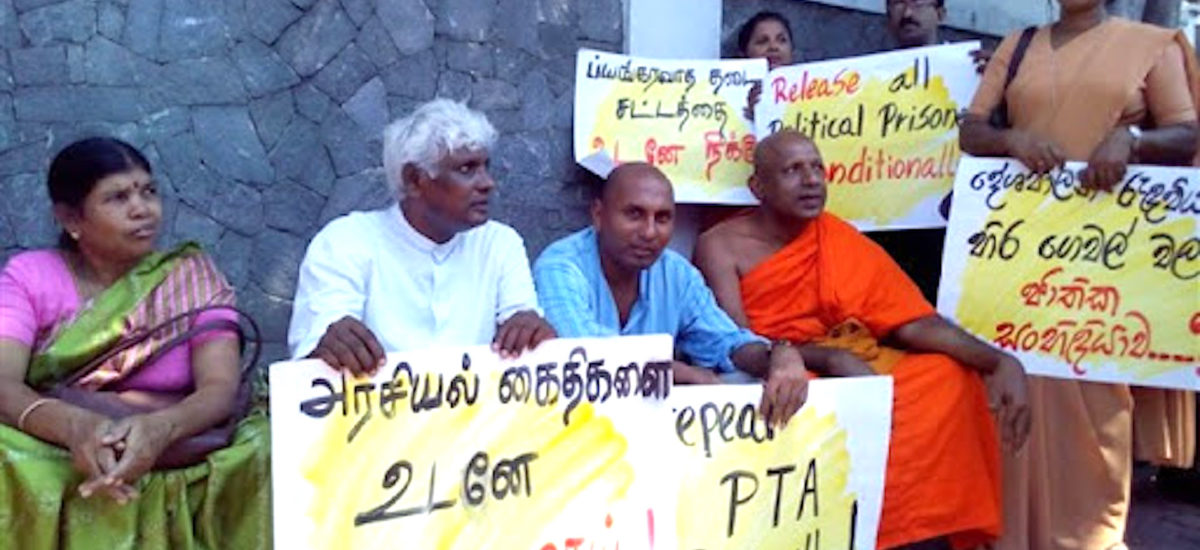Photo courtesy of Asia News
COVID-19 has been dominant factor in our lives this year.
Restrictions on travel and gatherings have made it more challenging for solidarity and mobilizing by survivors, victim families and activists. COVID-19 was used to restrict freedom of expression and assembly although multiple gatherings violating health guidelines were allowed and even screened on TV. Years-long struggles for justice in courts, on the streets and internationally, such as by families of disappeared and those whose lands have been occupied by the military, have been weakened in the aftermath of Easter Sunday attacks, elections and this year due to COVID-19.
COVID-19 also reduced the possibilities of institutional interventions for protection of rights. For example, there were court delays, including delays in processing bail applications, habeas corpus cases, and fundamental rights cases. Some of these resulted in prolonged detention of those unjustly detained such as Ramzy Razeek. The Human Rights Commission’s activities were also limited, especially in visiting places of detention. UN mechanisms were slow and constrained in responding to rights violations.
Institutions from whom we can seek interventions to prevent violations and seek redress after violations, such as the judiciary and the Human Rights Commission and the Office of Missing Persons will become less independent due to the 20th Amendment to the Constitution. Committed and competent leaders from some of these institutions resigned earlier this year.
There has been very little we could do this year as rights activists. As farmers, estate workers, fisherfolk, daily wage earners, apparel industry workers and other vulnerable groups lost livelihoods and struggled to survive in context of COVID-19. As Sri Lankan migrant workers lost jobs and were compelled to live in open parks, struggling to find food and to return home. As citizens were arrested and detained unjustly or without due process and their families appealed for help. As foreign nationals seeking temporary refugee in Sri Lanka continued to be in detention. As environment destruction escalated in practice and policy. As new tensions around land ownership and use emerged, often with ethnic dimensions. As even the flawed and limited processes set in motion for transitional justice for war time abuses were being rolled back. As anti-minority rhetoric, policies and practices escalated. As journalists, lawyers and activists faced assault, threats, detention and some of them opted for self-censorship or to flee the country.
Challenges were not only COVID-19 related and from the state.
I had been invited to speak at two Human Rights Day events today; the notice for one had a fully male and Sinhalese panel and the notice for the other featured 90 per cent men and Sinhalese in the panel. Colleagues and friends, especially Muslim women campaigning for rights, faced pressure from within their communities. Long standing school and church friends accused me of being a traitor for being critical of discriminatory, dominant and oppressive practices of my own ethnic (Sinhalese) and religious (Catholic) communities, especially its political and religious leaders. Others such as Tamils, Muslims and Evangelical Christians facing discrimination and oppression felt there is not enough support from outside their own communities. Colleagues and groups who worked on documenting injustices and violations, campaigning and solidarity actions moved on or became reluctant to support such efforts.
My elderly parents worry about reprisals from the state that is showing increasing signs of authoritarianism and unlike before, I think twice and thrice about their reactions before writing an article or being interviewed in mainstream media. Overall, it was a year where discouragement, loneliness, powerlessness, helplessness and hopelessness was dominant.
But there were inspirations that made it difficult to give up. Resistance and defiance continued in various forms on the streets, in courts, in traditional and new media and internationally. Survivors of rights violations who are now secure and relatively comfortable came forward to support others in difficulties. Students and young activists approached, offering support and willingness to join in struggles for rights and justice – sometimes behind the scenes and sometimes not being afraid to be seen and heard. A few newly elected MPs from smaller parties are showing signs of making their presence felt in parliament on issues of rights and justice. Some survivors and victim’s families continued their long years of struggles. New violations and injustices have led to new struggles by affected communities.
This year, as rights activists, we may not have lot of achievements to celebrate but Human Rights Day should also be a day to celebrate struggles and solidarity, especially in difficult and dangerous environments. And it should be an opportunity for critical self-reflection and to reinforce resistance, defiance and creative and long term struggles.

